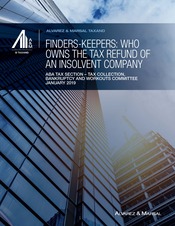Finders-Keepers: Who Owns The Tax Refund Of An Insolvent Company
In recent years, the ownership of a tax refund has become a major source of litigation. Potential claimants include creditors, affiliates and shareholders.
Many of the recent cases involve the FDIC. In a recurring situation, a banking subsidiary fails and is taken over by regulators. The bank holding company then files for bankruptcy. The bank holding company on behalf of a consolidated group carries back a net operating loss (NOL) and claims a refund from the IRS. The FDIC claims entitlement to the refund claim since the bank’s operating loss created the NOL and resulted in the claim for refund. The result is ligation between the FDIC (as receiver for the bank) and the bankruptcy trustee for the bank holding company.
Even though many cases involved the exact fact pattern described above, the results have not been consistent or predictable. The Tenth Circuit resolved a recent case in favor of the FDIC (on behalf of the banking subsidiary). Rodriguez v. FDIC (United W. Bancorp.), 893 F.3d 716 (10th Cir. 2018) (hereinafter United Western Bancorp).
This paper discusses United Western Bancorp in depth since it represents the most current thinking by the courts as to how these cases should be analyzed. This paper attempts to make some sense of the rules and cases, which can be inconsistent or vary based on fine distinctions.
The specific issues dealt with in this paper (i.e., the carryback of tax attributes for a refund) may not come up as often in the future. The so-called Tax Cuts and Jobs Act eliminated the ability to carry back NOLs that were created in 2018 and later tax years. PL 115-97, § 13302(b)(1). However, other tax attributes (e.g., capital losses and tax credits) can still be carried back.




